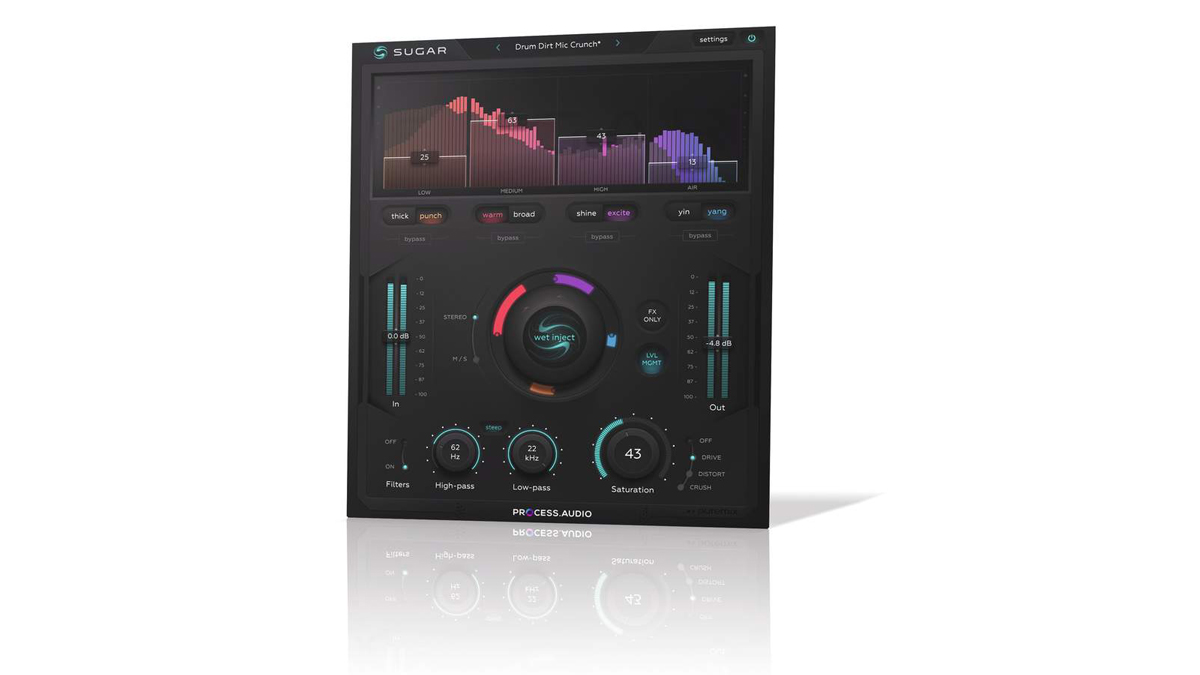MusicRadar Verdict
Sugar boils a raft of complex engineering processes down to a simple four-band plugin, and sounds great doing it.
Pros
- +
Sounds fantastic.
- +
Intuitive and easy to use.
Cons
- -
Can’t adjust crossovers.
- -
No wet/dry mix control.
MusicRadar's got your back
The debut plugin from the newly formed software division of audio training providers pureMix is a ‘sweetening’ effect (geddit?) for use on mixes, busses and individual instruments.
Sugar ‘intelligently’ applies compression, EQ transient shaping and other processes across four frequency bands, with no user-accessible parameters for them beyond the amount brought to bear.
Pour some Sugar
Each of Sugar’s four bands (Low, Medium, High and Air) offers two different processing modes - see Put your bands together - a Bypass button, and, in the default Stereo setup, a fader for ramping up the effect. In Mid/Side configuration, the last becomes a pair of faders for Mid and Side. Simply raise the fader for the band (or its M/S channel) you want to enhance until you like what you hear, flipping between the colours for two different vibes. The process is entirely additive, and the big Wet Inject knob in the middle raises and lowers all four bands together. This is an eye-candy alternative to a band link button, really, but it’s certainly convenient as a global ‘more/less processing’ control.
The FX Only button lets you hear the wet signal in isolation, while activating Level Management compensates for level changes by automatically moving the Output Gain slider up and down. The spectrum analyser, meanwhile, visualises the effect in terms of input and output levels across the frequency range.
Sugar’s eight band modes provide a significant measure of variability when it comes to the processes at work under the hood. Each of a band’s two modes loads a completely different effects chain, drawing on compression, EQ, phase rotation, harmonic excitement and more.
In the Low band, Thick mode adds weight and fatness to the bass and sub bass frequencies, while Punch enhances transients for impact and focus. The Medium band’s two settings - Warm and Broad - differ in the amount of midrange thickening they work up, Broad being more expansive in its frequency coverage.
The High and Air bands are where Sugar is at its tastiest and most useful. The Excite High band mode adds new harmonics to the upper frequencies, while Shine emphasises those that are already there; and the Yin and Yang Air modes present two flavours of very high frequency shelving and enhancement.
The band crossovers are linear phase, but this can be defeated when minimal latency is required or if you just prefer the (noticeably different, especially in the higher frequencies) sound without. The crossover frequencies are fixed depending on the mode selected for each band, and while we understand the thinking here - that their positioning is intrinsic to the tuning of the processes - the ability to move them would be welcome nonetheless, even if only for creative experimentation.
Any excesses at the top and bottom can be reined in using the onboard High- and Low-pass filters, which are switchable between 12dB and 48dB/octave roll-off, with cutoff frequencies ranging from 10Hz to 22kHz. The filters also follow the linear phase setting, changing to an IIR minimum phase algorithm when it’s disabled.
Finally, at the very end of the signal path, the Saturation module offers three increasingly strong styles of audio punishment: Drive, Distort and Crush. Once the amount of saturation dialled gets past about 40%, even Drive is anything but subtle, so this particular component needs to be handled with care.
Want all the hottest music and gear news, reviews, deals, features and more, direct to your inbox? Sign up here.
Sweet treat
Sugar does exactly what it sets out to: making stuff sound more present, focused, coherent, saturated and powerful via a minimal set of controls. The Air band, in particular, is pure magic in its lifting effect, and it’s always worth trying both modes for every band, as the differences between them can be profound. We find it most effective on busses and mixes - partly due to the unadjustable crossovers, and partly because of the fairly high CPU usage.
With the caveat that it could easily do more harm than good if deployed without the guidance of a well-trained ear, we can heartily recommend Sugar as a beautifully calibrated and sonically impressive multiband enhancer for mixing and mastering.
Computer Music magazine is the world’s best selling publication dedicated solely to making great music with your Mac or PC computer. Each issue it brings its lucky readers the best in cutting-edge tutorials, need-to-know, expert software reviews and even all the tools you actually need to make great music today, courtesy of our legendary CM Plugin Suite.

